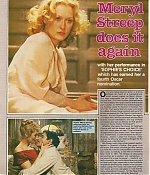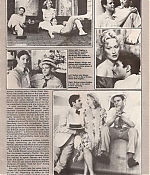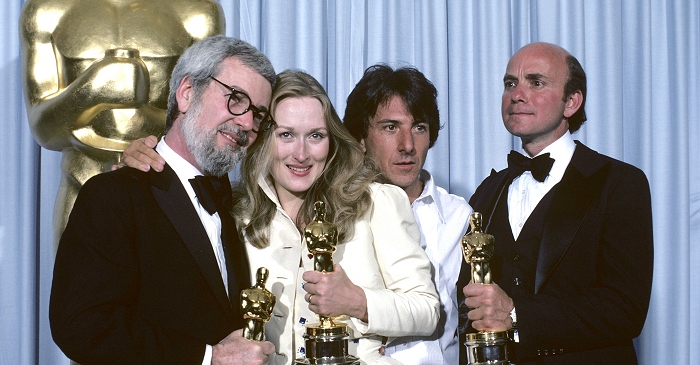|
Simply Streep is your premiere online resource on Meryl Streep's work on film, television and in the theatre - a career that has won her acclaim to be one of the world's greatest living actresses, winning three Academy Awards for "Kramer vs. Kramer", "Sophie's Choice" and "The Iron Lady". Created in 1999, Simply Streep has built an extensive collection over the past 25 years to discover Miss Streep's body of work through thousands of photographs, articles and video clips. Enjoy your stay and check back soon.
|
|
Meryl Streep does it again
Film Review ·
April 1983
· Written by P.S.H.
|
Only very rarely does an actor or actress achieve as much in a comparatively short screen career as Meryl Streep. She was nominated for an Oscar for her second film “The Deer Hunter” (she had made her movie debut two years earlier with a small part in “Julia”). In 1979 she won a Best Supporting Actress Oscar for “Kramer vs. Kramer”, her fifth film. Two years later she was nominated for a Best Actress Oscar and actually won the British equivalent for “The French Lieutenant’s Woman”. And for “Sophie’s Choice”, her eigth and latest film, she has received another Best Actress Oscar nomination. (On top of these accolades she won an Emmy for her performance in the tv drama “Holocaust”) Whether she wins the Oscar for “Sophie’s Choice” will not be known until April 11, the date this issue goes on sale. I’ll be extremly disappointed if she doesn’t win. (Her opposition, icidentally, is Julie Andrews for “Victor/Victoria”, Jessica Lange for “Frances”, Sissy Spacek for “Missing” and Debra Winger for “An Officer and Gentleman”).
Miss Streep really does give a superb performance in “Sophie’s Choice”. She gives it all she’s got. She plays a Polish girl who, having survived the horrors of Auschwitz concentration camp, is making a new life for herself in New York in 1947. Ms Streep is absolutely convincing as a person not completely in command of a new language – shy and vulnerable. Not only does she sound right but she looks right, especially in the flashback sequences showing her ordeal in the concentration camp. For these she had most of her hair shorn and she manages to look terrifyingly emaciated. However, for the New York sequences she looks radiantly beautiful. I defy anyone not to be moved by her brilliant performance. The character is based on an actual person author William Styron met when, as a young man, he rented an apartment in a rooming house. The resultant novel is partly autobiographical. In the film version, budding author Stingo (Peter MacNichol) has hardly set foot in his new apartment than he sees Sophie on the stairs being reviled by an agressive young man called Nathan (Kevin Kline). Much to her distress he walks out on her. But he comes back meekly and she forgives him. It soon becomes clear that Nathan, a Jewish intellectual, is paranoid. Stingo becomes involved with the couple, partly because of Sophie’s vulnerability in the face of Nathan’s sudden neurotic outbursts, and partly because he falls in love with her. Sophie eventually tells Stingo how she managed to survice the horrors of Auschwitz. Genuinly loving and sympathetic, Stingo asks her to leave the neurotic Nathan, marry him and go live on his parent’s farm. That is one difficult choice Sophie has to make. But there’s another – a decision she had to make at Auschwitz that would haunt her for the rest of her life. It will probably haunt you after seeing the film.
Kevin Kline, a newcomer to films, is frighteningly convincing as the unbalanced Nathan, and Peter MacNichol gives a far better performance as Stingo that one might expect after seeing his film debut in “Dragonslayer”. But it is Ms Streep’s haunting performance that dominates “Sophie’s Choice”. She gets into her part as few actresses have ever done. She learned to speak German and Polish (both are spoken in the flashback sequences.) One can well believe the claims that the character of Shopie “took her over” during the making of the film. She said it would take her some time to shake it fff, the effect that Sophie was having on her life. Regarding this effect on film audiences, I must confess it took me a couple of days to get the film “out of my system”, so powerful did I find it.












